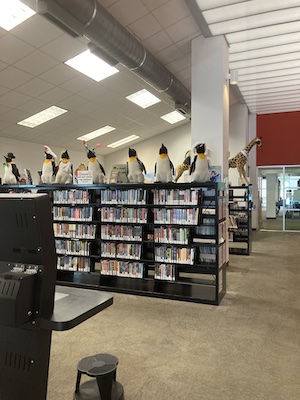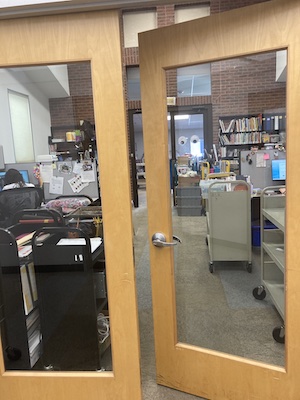September 30, 2025
Print, ebook, and audio
ISBN-13: 9780593640456
ISBN-10: 0593640454
Order Ebook:
The Librarians
Read an Excerpt »
Order the Book »
Go Behind the Scenes »
Murder disrupts the routine for four quirky librarians who hide among books to keep their secrets in this mystery from USA Today bestselling author Sherry Thomas.
Sometimes a workplace isn’t just a workplace but a place of safety, understanding, and acceptance. And sometimes murder threatens the sanctity of that beloved refuge....
In the leafy suburbs of Austin, Texas, a small branch library welcomes the public every day of the week. But the patrons who love the helpful, unobtrusive staff and leave rave reviews on Yelp don’t always realize that their librarians are human, too.
Hazel flees halfway across the world for what she hopes will be a new beginning. Jonathan, a six-foot-four former college football player, has never fit in anywhere else. Astrid tries to forget her heartbreak by immersing herself in work, but the man who ghosted her six months ago is back, promising trouble. And Sophie, who has the most to lose, maintains a careful and respectful distance from her coworkers, but soon that won't be enough anymore.
When two patrons turn up dead after the library’s inaugural murder mystery–themed game night, the librarians’ quiet routines come crashing down. Something sinister has stirred, something that threatens every single one of them. And the only way the librarians can save the library—and themselves—is to let go of their secrets, trust one another, and band together....
All in a day’s work.
Share:
The Story about the Story
The Journey
Sherry was asked to write this book. Her publisher wanted a feel-good contemporary mystery in the vein of Thursday Murder Club, but featuring librarians. They put the query to Sherry. Sherry was bemused—she rarely wrote contemporary stories and had never done either a workplace setting or an ensemble cast. Why her? But she did not ask the question; she simply accepted the advance and promised to deliver. :)
The delivering turned out to be a little more difficult than she anticipated. The characters stubbornly refused to gel and whatever she produced just seemed an uninspiring clump of words. For the first time in her career, Sherry considered giving back her advance—not seriously enough to actually contact her agent, but she thought about it.
In Shakespeare in Love, the character played by Geoffrey Rush explains to the moneyman that the natural condition of the theater “is one of insurmountable obstacles on the road to imminent disaster”.
“So what do we do?” asks the moneyman.
Geoffrey Rush: “Nothing. Strangely enough, it all turns out well.”
Moneyman: “How?”
Geoffrey Rush: “I don’t know. It’s a mystery.”
Writing a book obviously has far fewer moving parts than mounting a play, but it also feels kind of impossible and about to go off the rails, if a writer was ever on the rails to begin with. And then, similarly, in a rather mysterious manner, things come together. Characters become three-dimensional, plots interweave, words take on heft and begin to convey deep emotions.
And so it was Sherry persisted long enough for the story to surprise, satisfy, and ultimately, enthrall her. Usually when she comes to the end of her copyedits, she’s exhausted and ready not to see the story for a while. This time, as soon as her copyedits ended, she went back to read her favorite passages again.
This book is definitely one of Sherry’s personal favorites!
A Visual Guide
“The current incarnation is a red-brick building, its aluminum roof covered with solar panels. Two hundred yards away, a highway meets a local thoroughfare, but a shopping center separates and shields the library from the intersection. On the library’s large lot, much of which has been left unpaved, mature live oaks flourish and further foster a sense of comfortable seclusion.
Pleasant. Not impressive, but pleasant. And Hazel is satisfied with pleasant.”
(Sherry did take her own picture of the front of the library but it was quite inadequate so she decided to borrow from Google Maps for this one. The rest of the pictures are hers.)
(Also check back here when you want to know what Jonathan is hiding behind on a crucial night.)“The library’s two sets of automatic doors slide apart to reveal ten computer terminals set up for the public. To the left of the computer terminals are the stacks. To the right, the circulation area. An L-shaped children’s department wraps around the circulation area on the farther side, making the latter feel like a snug island, the warm heart of the library.”
“Behind the stacks a long, rectangular work gallery unspools with desks, chairs, and plenty of outlets set beneath a bank of wide windows. Outside the windows, thick vines on metal trellises form natural sunscreens.”
“Beyond the work gallery, invisible from the front entrance, nestles a reading area. There are fewer magazines on the periodicals shelf now—the times have not been kind to print publications—and the spin racks of audio CDs too are gone. But DVDs still take up half a wall and the collection of graphic novels has proliferated.”
Children’s area.
These two doors, which you also see in the background of image 2 above, are the door of the staff breakroom, otherwise known as the Den of Calories in the book, and the door of the administrator’s office. Where the big ventilation pipe disappears is the corridor to the meeting room.
The double doors—locked on the day Sherry went to take pictures--lead into the meeting room, which looks like any other library meeting room you've ever seen. But the door to the right...
“Next to the meeting room is a perennially closed door that hardly anyone notices. Behind it rises a flight of narrow metal steps clad in blue thermoplastic. The steps lead up to a hidden gallery overlooking the circulation area, which serves as access to ducts and machinery essential for the smooth running of the building.
In the darkness inside the gallery, Hazel sits on a folded blanket, her back against a wall. The air is slightly stale up here, stale and warm. She racks the Glock in her hand.”“The staff office boasts a decent tally of square footage. But with four full-size desks, two on each side of the traffic lane leading to the drive-through pickup on the far wall, as well as a number of rolling bins, rolling carts, and crates, luxuriously spacious it is not.”
In the scene set in the staff office, Sherry did away with the privacy screens on the desks in a fit of artistic license.Apartment buildings that are quite close to the library. The proximity becomes important for some later scenes.
Excerpt
The man captured by the library’s surveillance camera does not appear to be in desperate straits.

CCTV footage in real life is not always black-and-white or grainy—this one has medium resolution and rather desaturated colors. Viewing the footage, it’s easy enough to make out that the man sports a light blue Oxford shirt, open at the collar, sleeves rolled up.
With his slightly long hair held back from the forehead by a pair of bronze-tinted sunglasses, he looks like a young Hugh Grant, someone who has enough charm, talent, and privilege to survive a hooker scandal with his career intact.
He strolls along the stacks, occasionally crouching down to examine a row of books on the bottom. Several times he pulls out a volume, flips through it, then opens it until the front and back covers almost touch—as if to test the binding.
The next day’s footage is even longer, fifteen uninterrupted minutes of Kit Asquith wandering about the library.
What was he doing? And did he know then that in less than three weeks he would be dead?
In the final recording, Kit Asquith enters the library with a cardboard box. It looks heavy. He disappears from frame for a few minutes. When he reappears, he is still holding the same box. Again he strolls the stacks, sometimes taking down a book to drop into the box, sometimes putting one from the box up onto the shelves.
After ten minutes of this, he leaves—never to be seen on these premises again.
Maybe it’s for the best that no one can figure out what Kit Asquith did in the suburbs of Austin, Texas—or where he hid the twenty-five million dollars he stole. Late-stage capitalism is the golden age of fraud, and financial crimes are thick on the ground. In a year Kit Asquith will become a footnote. In five years he won’t even merit an ancillary remark.
Provided, that is, his widow stays far, far away from this insignificant little library.
Chapter 1
Austin, Texas
In the fortunate places of the world, libraries are everywhere to be found.
Some are architectural marvels. Some are touchstones of civilization. Some awe by the depth and vastness of their seemingly infinite collections.
But the greater wonder is perhaps not the phenomenal libraries proudly associated with illustrious universities or storied seats of power. The greater wonder lies in the ordinary ones, the ones that in fortunate places are everywhere to be found.
They exist and serve quietly, standing apart not at all from their unexceptional surroundings. Sometimes they are squeezed into tight corners; sometimes they share walls with grocery stores and sellers of electronic cigarettes. There is rarely anything unique or unforgettable about their collections, humble aggregates of popular novels, standard reference volumes, how-to books, and DVDs for those who don’t yet stream all their audiovisual entertainment.
Yet their ubiquity is their most fundamental virtue. Their unremarkable holdings would have dazzled scholars from the Age of Enlightenment. And as much as anything, they represent a community’s investment in its members, a commitment to care for and nourish hearts and minds.
Or libraries can be merely another place to work, another place of mundane chores, minor dramas, and mediocre compensation.
I have become a pessimist, thinks Hazel Lee.
Or perhaps she has long been a fatalist in an optimist’s athleisure, her acceptance of the inexorable sweep of fate and entropy masked by her willingness to put some effort into the here and now.
Her grandmother wanted her to take a position with the library system and Hazel acquiesced. But she didn’t think she would be assigned to this particular branch. Nainai, on the other hand, is delighted. “So close by. And you loved going there when you were a little girl.”

One should be wary of revisiting childhood icons. Epics she adored turn out to have undertones—and overtones—of sexism and colonialism. People she loved embody a large spectrum of human frailties. Places that occupy hallowed ground in her heart are demolished or become something else entirely, such as the old noodle shop that is now an establishment called The Furless Kitty, specializing in Brazilian waxing.
The branch library too has changed. The current incarnation is a red-brick building, its aluminum roof covered with solar panels. Two hundred yards away, a highway meets a local thoroughfare, but a shopping center separates and shields the library from the intersection. On the library’s large lot, much of which has been left unpaved, mature live oaks flourish and further foster a sense of comfortable seclusion.
Pleasant. Not impressive, but pleasant. And Hazel is satisfied with pleasant. She parks her e-bike on the rack at the front of the library and hooks her helmet to her backpack. Nearer to the entrance stands a stack of a free regional weekly. She remembers the publication from decades ago and is happier than she thought she would be that it still exists.
A hesitant question comes as she browses the latest issue’s guidance on the upcoming off-year election. “Hi. Are you Hazel?”
Hazel turns around; a young white woman in her late twenties waves. Other than the red streaks in her sandy hair, she looks a lot like a hobbit, round-faced, with pink cheeks and brown eyes. Hazel can see her dancing, in the exact dusty-rose sweater vest and long corduroy skirt she’s wearing, at Bilbo Baggins’s eleventy-first birthday party.
In other words, absurdly cute.
She smiles. “Yes, hi, I’m Hazel.”
They shake hands. The young woman, who speaks with a Scandinavian accent, introduces herself as Astrid, a librarian at the branch.
“It’s great to have you here,” says Astrid, looking a little shy. “Let me open the place up and show you around.”
The library’s two sets of automatic doors open to reveal ten computer terminals set up for the public. To the left of the computer terminals are the stacks. To the right, the circulation area. An L-shaped children’s department wraps around the circulation area on the farther side, making the latter feel like a snug island, the warm heart of the library.
Behind the stacks a long, rectangular work gallery unspools with desks, chairs, and plenty of outlets set beneath a bank of wide windows. Outside the windows, thick vines on metal trellises form natural sunscreens.
Beyond the work gallery, invisible from the front entrance, nestles a reading area. There are fewer magazines on the periodicals shelf now—the times have not been kind to print publications—and the spin racks of audio CDs too are gone. But DVDs still take up half a wall and the collection of graphic novels has proliferated.
Given that Halloween is right around the corner, there are a fair number of skeletons scattered around the library, mostly on posters that will be taken down on November first. But there is a fully articulated skeleton in the children’s area, peering intently into a shelf of image-heavy compendiums on dinosaurs. Not far away, three chubby and friendly-looking ghosts cluster around a Brambly Hedge collection.
Astrid has Hazel deposit her personal items in the librarians’ office, sandwiched between the circulation area and the drive-through pickup at the very back. She helps Hazel turn on the public terminals and the checkout stations’ computers, then introduces Hazel to Sophie, a striking Black woman in a perfectly fitted hunter green suit and sky-high heels, and a tall, bearded white man named Jonathan—Sophie is the branch administrator, Jonathan their program director.
She also presents two other librarians, but Inez and Raj protest that they are only clerks, not real librarians. Hazel takes that to mean that they, like her, do not have an advanced degree in library and information science. Not everyone at an attorneys’ office is a lawyer and not everyone on a flight crew is a pilot—Hazel, no information specialist, will shoulder relatively humble duties.
“To the public we are all librarians,” insists Astrid. “And you’re one of us now, Hazel. You’re going to love it here.”
Before Hazel left Nainai’s house this morning, the venerable old lady said, “Go on. Start a new life for yourself.”
Except Hazel does not want a new life. She would simply like to have her old life back, that untroublesome existence she hadn’t appreciated enough when she still drifted along its placid currents.
She smiles at everyone. “Thank you. I’m delighted to be here.”
Astrid has done a lot of fantasy casting over the years, putting faces—mostly those of well-known actors—onto characters from her favorite books. Hazel, she is sure, would have been perfectly cast as a woman with whom a chance encounter alters the course of a protagonist’s life.

Or at least costs them sleep and focus for a good long while.
She is beautiful—perfect forehead, wide-set eyes, complexion as smooth as fondant on a wedding cake. Yet it isn’t her loveliness that instantly fascinates Astrid.
Near the university campus where Astrid spent her undergraduate years, there was a lake that teemed with expensive properties along its shores. One was finished right as Astrid began her freshman year.
The house stood empty for a few weeks, then one day, curtains appeared. A few days after that, some downstairs curtains were pulled back to reveal a spotless living room, a baby grand piano set against a far window, a blue settee to the side.
Those downstairs curtains never closed again. No matter what season of the year or day of the week Astrid walked, biked, or rollerbladed by, the curtains were always open, the settee plush and inviting, the piano placed just so to silhouette against the lake beyond the house.
Never in her four years there had Astrid seen a single person inside, a car on the driveway, or a stray toy on the lawn. The house seemed to exist in its own separate reality, so much so that it was always a shock—and a profound thrill—when a fully-lit Christmas tree appeared next to the piano each December.
Hazel, like that house, also seems to exist on her own plane.
Her attire is simple, a black blouse over a pair of black trousers, but they drape beautifully over her tall, elegant frame. When she speaks, though her accent is North American enough, Astrid hears echoes of distant lands, a life lived globally. (And her instinct is proven correct within the hour, when Hazel tells Inez that she’s spent most of her life in Singapore and moved back to the US only recently.)
For someone who should exude glamour, though, Hazel manages to be marvelously low-key. Shortly after she meets the morning crew of librarians, it’s as if she’s always been there. She moves about at an unhurried pace, yet when Astrid looks in on her around lunchtime, she finds that Hazel has culled all reserved titles that have not been picked up on time, pulled all the new requested transfers, and restocked two entire rolling carts of sorted returned items.
And then sauntered out of the library.
Astrid retreats into the Den of Calories, the affectionate term for the staff breakroom. Jonathan is there, munching on a bag of Indonesian cassava chips. When people think of librarians, they don’t immediately conjure a six-foot-four, blond, blue-eyed former college football player. Jonathan is all that and more and he is a great librarian.
“Why, hello, Divinely Beautiful,” he says, holding out his bag of chips. “Want some?”
The name Astrid means “divinely beautiful.”
“Yes to chips, always.” She reaches into the bag and grabs one. “Unfortunately, I’ve only ever looked like a younger version of Mrs. Weasley—like when she’s had two kids, rather than seven.”
Her Swedish genes have not endowed her with either height or svelteness, and the pale hair she was born with turned brown sometime in her teens, a common enough occurrence for those of Scandinavian heritage.
Jonathan recoils in mock horror. “How dare you! I’ll have you know Molly Prewett Weasley is and has always been an absolute babe.”
Astrid laughs and thanks him. They chat another minute while Astrid’s lunch heats up in the microwave oven. Then Jonathan cleans up after himself and goes back to work, leaving Astrid to slurp down her chicken chow mein by herself.
When she first arrived at the library, she ached for Jonathan to become her long-awaited gay best friend. But while Jonathan has always been kind and helpful, a special bond has not blossomed between them.
The gay men of the world are too busy with their own lives to revolve around her, and the hetero ones have no use for her if she isn’t willing to immediately proceed to the “chill” part of Netflix and chill.
And the one exception, a man she met at this very library, crushed her as if he were a junkyard compactor and she a 1982 Datsun.

One does not become a librarian dreaming of luxury and acclaim. Astrid wants to be useful and she wants to achieve quiet contentment. But quiet contentment is beginning to feel like the hardest boss level in the game of life.
At least the noodles from Trader Joe’s, a store famously geared toward the “overeducated and underpaid,” of which librarians form exhibit A, are chewy and flavorful.
Astrid wonders what Hazel is having for lunch. Something low-key molecular, she hopes.
Hazel returns from lunch in perfect time to sit down for her first desk session, an hour at the checkout station facing the public.
Not every librarian enjoys dealing with patrons. Astrid does. Other than an occasional best-forgotten battle with the toilet—what exactly is the correct way of retrieving a loaded diaper that has been knocked inside?—she likes the “public” aspect of working at a public library.
Patrons don’t need to tell her why they need to use the library’s terminals, but their tales of visiting grandchildren accidentally destroying the CPU with a water-soaker rivet her. She has good conversations every November with those who need to prepare a Thanksgiving feast that accommodates every dietary restriction under the sun. And she loves helping people find correct tax forms and fill out employment applications.
Obviously, iffier members of the public show up too. But early afternoon on a Monday, with kids still in school, isn’t a heavily trafficked time slot.
Hazel, who, like all new hires, has received training at the central library downtown, checks out books like a pro and processes two new library card applications without a hitch. She even fields an I-don’t-know-the-author’s-name-or-the-title-but-can-you-help-me-find-this-book inquiry with panache. Astrid, the list Hazel generated in hand, takes the patron to the stacks and the older gentleman exclaims with excitement at the second book she pulls out—precisely the one he’s been looking for.
Her delight in Hazel’s excellence is polluted by a bit of melancholy: At the rate Hazel is going, she won’t need any help from Astrid. But when Astrid returns to the circulation desk, she finally has a chance to be useful.
A youngish South Asian couple want to know about Game Night, taking place the next evening, and Hazel, new to the branch library herself, puzzles over the flyer the couple handed her.
“Oh, I can answer your question,” Astrid says eagerly. “The library will provide all the board games; you only need to bring yourselves. Because it’s so close to Halloween, the inaugural Game Night will be murder-mystery themed. We’ll have Halloween decorations and snacks, and you can even come in Halloween costume, if you’d like.”
The wife, whose lavender headscarf matches the embroidery on her cream tunic, does look tempted. But she frowns a little. “Do we need to sign up and commit?”
“Oh, no, not at all,” Astrid reassures her. “You can sign up via the library’s website, if you’d like, but you don’t need to. Just show up tomorrow evening. And you don’t have to dress up either—only if you feel like it.”
The couple promise they will think seriously about attending and disappear beyond the stacks in the direction of the work gallery.
“Can I come too?” asks Hazel. “I like board games.”
She smiles a little, as if to herself. And Astrid feels as electrified as when a Christmas tree appeared in the house by the lake, tinseled and festooned, lights gently twinkling.
To Astrid, tabletop gaming is like gardening: something she might look into later in life. But if Hazel will host board game nights, then Astrid doesn’t mind taking it up right away.
“Of course you can come. You’ll be most welcome!”
“Does the library have that many murder mystery games?” asks Hazel.
The central library downtown has a decent collection of tabletop games, but their little branch does not have that nice touch yet. Astrid is about to explain that the difficulty they’re having with Game Night is not the number of games required but a lack of interest on the part of the patrons, when a man north of seventy makes a beeline for Hazel.

“Why, hello, are you new here?”
Oh, no, not this guy. If this were a cartoon, his eyeballs would be bouncing all over Hazel, maybe even stuck to the front of her shirt.
Hazel smiles—for someone who feels so enigmatic, she has a very friendly smile. “Yes, today is my first day.”
“Welcome to the library!” The old dude, his pale skin slack and crepey, returns an unctuous grin. “I love this branch. All the librarians here are so nice and helpful.”
Yes, and all the nice and helpful librarians would love it if he never came back.
“That’s wonderful,” says Hazel in her low, soft voice. “How can I help you?”
The man sets a pair of reading glasses on his nose and pulls a slip of paper out of his pocket. “Let’s see.”
If he doesn’t say Fifty Shades, then the enshittification of the internet ends today.
“Fifty Shades,” says the man, glancing up as he smooths his stringy comb-over. “That’s the book my lady friend recommends.”
Social platforms erode, water is still wet, and Astrid will bet her collection of BTS photocards that said lady friend is of the inflatable variety.
Calmly Hazel taps on her keyboard. “We have a great many titles that begin with the words ‘Fifty Shades.’ What is your book’s subject matter, sir?”
“Really? I thought there was just the one.”
“There are a lot of them. There is Fifty Shades of Grace, which looks to be a spiritual memoir. Fifty Shades of Bipolar, for essays on the subject. And in the realm of cookbooks, we have Fifty Shades of Kale and Fifty Shades of Chicken, if you are interested in trussing poultry.”
Astrid suppresses an urge to laugh.
“Oh,” says the old guy. “I see. I see.”
Is the troll wondering whether he is being trolled? Yes, you are, troll!
“I think mine is fiction,” he adds gamely.
“All right. Let me adjust my search parameters, then,” answers Hazel, clicking and scrolling. “Still a ton of titles. Fifty Shades of Crystal. Fifty Shades of Haiku. Fifty Shades of Hell. There appears to be a fifty shades of everything.”
The old guy clears his throat. “Maybe there’s a color in the title?”
“Fifty Shades of Black? Fifty Shades of Greyhound?”

Astrid coughs so she won’t giggle.
“Gray, yes. That’s the color.”
“Fifty Shades of Dorian Gray, Fifty Shades of Earl Grey, or plain old Fifty Shades of Grey?”
“Plain old Fifty Shades of Grey,” mutters the old guy in relief.
“And would you like to read it from the point of view of the female protagonist or the male one?”
“There are two versions?”
“Yes. Or perhaps you’d prefer the cinematic version instead? We have it on DVD.”
“I . . .” The old man perks up a bit. “Do you have any recommendations as to which version I should go for?”
“Ah,” says Hazel, “I’m afraid I can’t help you there. I’ve never read the book or watched the movie.”
“But I thought librarians read everything.”
“Maybe some librarians do but I haven’t yet. And when I do read erotic fiction, I prefer the male-male variety. I can recommend many good titles in that subgenre. Would you like a few, sir?”
Ah, what joy to behold the unwelcome patron’s hasty retreat. The 1812 Overture—or whichever tune plays on Fourth of July right before the fireworks start—should be blaring out of the PA system right now, all pomp and triumph. Serves you right, dirty old man, wasting public servants’ time for your stupid titillation.
The automatic doors open. The old man wobbles out. Astrid at last allows herself to grin openly. She sits down at the idle terminal next to Hazel and looks into the library’s catalogue. Hazel has not exaggerated: the system does own all those titles and more for the delectation of the public.
It would be rude to discuss patrons out in the open, so she leans toward Hazel and whispers, “Do you really read male-male erotica?”
Hazel smiles a little. “Librarians read everything, right?”
What a mysterious and unsatisfying answer. Can Astrid press a little—maybe even confess that she has read more than a few fanfics on what BBC Sherlock and Dr. Watson get up to after hours at 221B Baker Street?
Or maybe that would be too much, given that they met only this morning.
Reluctantly, Astrid straightens, tells Hazel that she’s doing a great job, and flounces out of the circulation area. There’s a middle school less than a mile from the library. After school a fair number of kids come to the library, and Astrid usually spends part of her afternoon in the children’s area, supervising and helping with homework.
Her path takes her near the front entrance, the automatic doors of which part at that exact moment to admit the man who made her feel cherished and understood—and then ghosted her without a backward glance.
Chapter 2
George A. Romero is likely spinning in his grave, but someone who ghosts you and then reappears back on the scene as if nothing happened is called a zombie.

Yet as Astrid’s personal zombie apocalypse looms, she is elated. She always hoped that there was a legitimate reason behind Perry’s abrupt disappearance, that someday he would return to explain everything.
And here he is, looking strong and healthy. Eager. She wishes, all at once, that she hadn’t worn such a hobbitcore outfit today. She actually has an oxblood suit that’s quite sleek. And he—
He walks right past her, as if she were one of the public computer terminals, and heads for Hazel.
Astrid, her hand half-raised in greeting, turns into stone.
“Hi!” says Perry to Hazel.
He sounds breathless.
Astrid understands. She really does. In front of Hazel, she too has a hard time keeping her cool.
“I have an oddish question I hope you can help me with,” Perry continues.
If he enunciated better, he’d sound like a Shakespearean actor, someone who bellows Once more unto the breach, dear friends eight times a week to thunderous applause. But he lacks that perfect elocution because of a speech impediment—and she once found it so very charming.
“I can try,” says Hazel.
“A friend of mine is a movie producer. Occasionally, when he evaluates a script, he wants a little on-the-ground research.”
This is beginning to sound eerily, grotesquely familiar. Is his next sentence going to be about a thriller that takes place in a library?
“The script he’s looking at is a thriller that takes place in a library very much like this one. And he wants to know, realistically, how long a book can sit undisturbed on the library’s shelves? And what library policies or procedures might shorten or elongate that time frame?”
Is this what it feels like to have her eardrums blown out?
“Interesting questions—must be a fun script,” says Hazel. “I’m probably not the best person to answer since I’m new here. But I’m sure my colleagues can help.”
She looks behind herself. “Jonathan, could you come here for a second?”
Astrid thought she’d turned into a pillar of salt. But at that moment she moves fast enough to give Usain Bolt whiplash.
On the day Perry first came into the library—with those same questions—Astrid too asked Jonathan for help. She wasn’t exactly sure how RFID technology worked and wanted Jonathan’s input.
Another librarian might not have remembered Perry, but Jonathan would have taken note of a handsome Brit who respectfully acknowledged his expertise.
And she couldn’t bear it if Jonathan were to see her now.

Not at the moment he realizes, as she did, that Perry is just a younger, posher version of the Fifty Shades dude.
Six and half months ago
Astrid stares across the parking lot of the library.
With the vine-laden trellises behind her, she can only see cars, asphalt, and the apartment complex beyond. But she knows that less than a mile ahead, the land folds into small canyons thick with yaupon and ash juniper—the first undulations of Texas Hill Country.
As long as it isn’t stuck under a heat dome, Austin, ribboned with greenbelts and rich in reservoir lakes, is a great place for the active lifestyle. Despite having always loved books and libraries, Astrid also adores open air and an unpaved path.
When the very outdoorsy Becky became her roommate, Astrid was delighted. She envisioned them hiking, cycling, and paddleboarding around town. She even imagined road trips to Marfa and Big Bend.
Then Becky showed a normal amount of interest in Astrid and Astrid became Greta Garbo, noted recluse.
Now Becky is moving out. She and her boyfriend might even buy a place together, if they can find one they’ll qualify for. Astrid is happy for Becky. But Becky progressing to the next stage of her life only highlights that Astrid is stuck.
No, worse than stuck. Her life has shrunk year by year.
“Hi, is this seat taken?”
Astrid looks up. It’s the British guy who asked about a movie script’s verisimilitude earlier. And he’s gesturing at the bench on the other side of the picnic table.
“Ah, no,” she said. And then, after a moment, “Feel free.”
He sits down across from her and smiles. “Spring in Texas is less sweltering than I feared—I thought I’d have to stay inside all the time.”
He has a nice smile and bright, even teeth—have Hollywood standards of glamour swept aside the supposed British disdain for orthodontia and cosmetic dentistry? The smile also brings out attractive wrinkles on the outer corners of his eyes. Earlier she gauged him to be in his midtwenties, but he must be her age—twenty-nine—or thereabouts.
“April is unpredictable. Last week the temperature went up to”—she calculates in her head—“around thirty-three degrees Celsius.”
“You mean more than ninety Fahrenheit?” He grins again. “In the UK when it’s cold, we use Celsius and say it’s below zero. But when it’s hot, we switch to Fahrenheit, because it’s much more dramatic to shout, ‘Blimey, it went over a hundred!’”
She chortles, even as the gears in her head smoke from trying to figure out if he’s flirting with her.
It’s not as if patrons never do, but usually she shuts it down right away. But in this instance she might not mind. He’s good-looking in a slightly dorky way, which is exactly up her alley. And his gaze feels kind.
“Would you like some cookies?” she asks, pointing to a couple of sealed packets on the perforated picnic table.
He takes one packet. “I’m Perry, by the way.”

“Astrid.”
“That’s an Old Norse name, isn’t it?”
Astrid tenses. People being knowledgeable about Old Norse anything makes her nervous. “Yes.”
She hopes he can hear the disinclination in her voice—she’s not interested in being an accessory to his Viking fascination.
“I spent two semesters in Sweden, first when I was in school, and then again in uni. Do you speak Swedish by any chance?”
A very reasonable question, given that they had a fairly lengthy conversation earlier in the day with her speaking in a Swedish accent.
The day is mild; it can’t be more than sixty-eight degrees. Astrid, however, feels as if she’s chosen to sit on this thermoplastic-coated metal bench when it’s one hundred and eight in the shade.
It happened once before, at a party in grad school. Someone came up to her and started speaking in Swedish. She was surrounded by her fellow library science students, her skin on fire with desperation. Thanks to the two shots of tequila already in her, she ground out, “I prefer to speak English when I’m Stateside.”
The Swedish student shrugged and walked off. And Astrid has zero recollection of the rest of the night.
But today there’s no one else within hearing range. And the man opposite her . . .
“Do you live in Austin,” she asks, “or are you passing through?”
“I don’t live here. I’m just here on business—for a short while.”
“I don’t speak Swedish.”
He’s taken aback. “Oh, I apo—”
She holds up her hand—she realizes belatedly that she was still speaking in a Swedish accent. These days, it’s not as easy to switch back. “And I don’t speak Norwegian, Danish, or any other Nordic languages. I don’t speak any language other than English.”
He blinks. Does he hear her new accent? Her real accent, the one she grew up with, as American as Jell-O salad and interstate highways?
“I’m sorry if you wished to practice your Swedish. I’m just an American from flyover country. I’ve some Swedish ancestors, but that’s about it.”
“Oh,” he says.
The hush that follows feels like a thousand paper cuts. She doesn’t know why she told the truth. It doesn’t even feel like she made any major decisions at all. She was just too tired to act out the same old charade for yet another person, a transient who will soon be gone from her life.
Maybe she should have made the effort. The perplexity and reproof she hears in the awkward silence—that’s why she could never own up to her little hoax, isn’t it?

“Actually”—he laughs a little—“I wanted to speak to you not to practice my Swedish, but because you have lovely eyes. And you were very patient with all my silly questions earlier.”
It becomes her turn to say “Oh,” unable to follow it up with another word.
“I am, in fact, profoundly relieved that I don’t have to speak Swedish—I’m absolutely rubbish at it.” He again laughs a little—does he laugh when he’s embarrassed?—and clears his throat. “I hope it’s not unseemly, but now I want to know why you were maybe pretending to be Swedish. Can I—ah—um—buy you a drink when you get off work?”
This feels like a dream sequence from Inception. Are the placid neighborhoods around the library going to rise up and fold in on themselves? “You want to go out with someone like me—someone fucked-up?”
He shrugs. “It’s the twenty-first century. Everybody is fucked-up. Maybe there’s a chance that we’re fucked-up in ways that are mutually comprehensible.”
He fidgets a little as he waits for her response and the hopefulness in his gaze causes an abrupt swell of tears in her eyes.
“Thank you,” she says thickly.
So this is what gratitude feels like, a fountain bubbling in her heart, iridescent and inexhaustible.
And then, after a long moment, she remembers his question and adds, feeling as shy as an adolescent, “Yes, I can do drinks after work.”
Present day
When Astrid was in high school, she read Ted Chiang’s “Story of Your Life” and thought it achingly beautiful. But it was only during the pandemic, when she streamed Arrival, the movie based on the novella, that she finally got the point of the story, that by studying the aliens’ language, the female protagonist begins to see time as they do, and that she chooses to marry her colleague and have a child with him, even though she has foreseen that the marriage will fail and that their daughter will die from a rock-climbing accident when she is twenty years old.
Astrid often ponders the protagonist’s choice, as she both understands and does not understand it. If she could see the future, she would have made so many decisions differently.
Those right swipes that led to only self-doubt and emptiness? She wouldn’t have installed the app in the first place. The youthful stupidity that led her to believe that pretending to be Swedish would be fun and broaden her horizons? Her kingdom for a time machine.
And that extraordinary week with Perry?
“Hi, Astrid.”
She stills—then continues with her book pulling. In a few days, the display of Halloween and Día de los Muertos picture books will be coming down and she will exhibit a new batch of books on Diwali, Bon Om Touk—both of which take place in November this year—and Thanksgiving.
“Hello, Perry,” she says, not looking at him.
“When I spoke to your colleague just now—it wasn’t what you think it is.”
He sounds as sincere as he always did, but the fountain in her heart has tumbled down and become trash-choked, rusty, broken pipes gaping at nothing and no one.
She kneels and finds the two Diwali books on her list. “I’m sure you’re right.”

Silence. And then, into that silence, the arrival of the middle schoolers. They talk at half volume, but they are still chatting and chortling. Several boys settle down at the children’s area’s computer terminals, their backpacks landing on the floor with solid thumps.
Perry lowers his voice. “Can we speak somewhere more private?”
She takes him to the empty meeting room—the last thing she wants is a scene.
“Please, Astrid, believe me, none of this is what you must think,” he repeats himself as soon as the doors close behind them.
She knows that his voice is not echoing from the blank walls of the meeting room. She also knows that the folded tables and stacked chairs are not revolving dizzily around them. It’s only the sudden eradication of hope, leaving her weakened, unsteady.
“What is it, then, you showing up here and playing the same charade with my beautiful new colleague?”
Perry grimaces. “I’m sorry that I can’t explain anything yet but I want you to know that I hate that I’ve made you unhappy. That was never my intention.”
Astrid bristles. Yes, he’s made her unhappy, but how dare he bring it up as if of course he has that kind of power over her. “Perry, let’s not be dramatic. We had a situation. It was always going to be short-term. I didn’t dwell on it after you left and you don’t need to dwell on it now.”
He has the audacity to look hurt, which only makes her angrier.
“Excuse me. I’m still at work,” she says—and marches out.
Copyright © 2025 by Sherry Thomas. All rights reserved.























